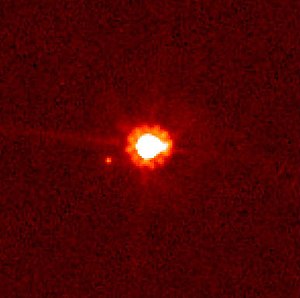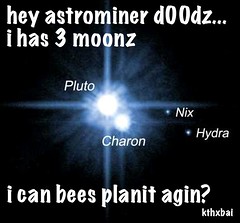Pluto still failed to be recognized as a planet after this week's international astronomical meeting held by the
International Astronomical Union (IAU) in Rio Janeiro. We can still recall the controversial move made by the IAU to demote Pluto as a "
dwarf planet" three years ago in the same meeting held in Prague. The world witnessed table bangings and walk outs of some astronomers after the decision has been laid down.
 Image by Image Editor via Flickr
Image by Image Editor via Flickr
The decision was based on the fact that it failed to pass the criteria to be major body on it's orbit. Pluto's mass only accounts for 0.07 of the entire mass of all objects in its orbit (which includes
gas giant Neptune because their obits intersect). In contrast, earth is more than a million times heavier than all the objects on its orbit (which includes the moon).
Pluto joined the group of the dwarf planets that includes
Ceres,
Haumea,
Makemake, and
Eris. Image via Wikipedia
Image via Wikipedia
(Right)The orbit of Haumea
 Image via Wikipedia
Image via Wikipedia
(Right) Image of Eris and its moon Dysnomia
(Below) Pluto and its moons.
 Image by the mad LOLscientist via Flickr
Image by the mad LOLscientist via Flickr
 Image by Samchio. via Flickr
Image by Samchio. via Flickr





![Reblog this post [with Zemanta]](http://img.zemanta.com/reblog_e.png?x-id=3983138f-d867-411d-bca4-8ee73a078dc7)